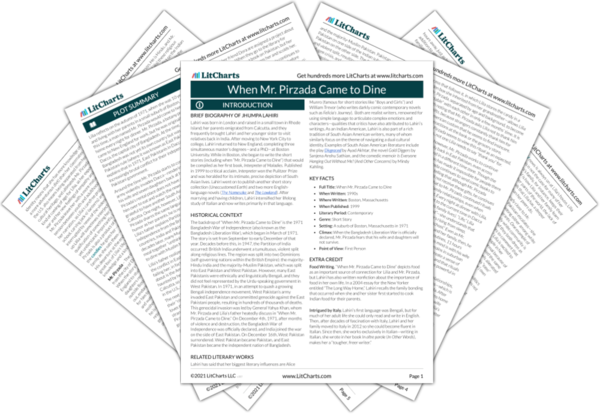Lilia’s Father Quotes in When Mr. Pirzada Came to Dine
It was a small campus, with narrow brick walkways and white pillared buildings, located on the fringes of what seemed to be an even smaller town. The supermarket did not carry mustard oil, doctors did not make house calls, neighbors never dropped by without an invitation, and of these things, every so often, my parents complained. In search of compatriots, they used to trail their fingers, at the start of each new semester, through the columns of the university directory, circling surnames familiar to their part of the world.
[My father] led me to a map of the world taped to the wall over his desk […] his finger trailed across the Atlantic, through Europe, the Mediterranean, the Middle East, and finally to the sprawling orange diamond that my mother once told me resembled a woman wearing a sari with her left arm extended. Various cities had been circled with lines drawn between them to indicate my parents’ travels, and the place of their birth, Calcutta, was signified by a small silver star. I had been there only once and had no memory of the trip.
We learned American history, of course, and American geography. That year, and every year, it seemed, we began by studying the Revolutionary War. We were taken in school buses on field trips to visit Plymouth Rock, and to walk the Freedom Trail, and to climb to the top of the Bunker Hill Monument. We made dioramas out of colored construction paper depicting George Washington crossing the choppy waters of the Delaware River, and we made puppets of King George wearing white tights and a black bow in his hair. During tests we were given blank maps of the thirteen colonies, and asked to fill in names, dates, capitals. I could do it with my eyes closed.
I coveted each evening’s treasure as I would a jewel, or a coin from a buried kingdom, and I would place it in a small keepsake box made of carved sandalwood beside my bed, in which, long ago in India, my father’s mother used to store the ground areca nuts she ate after her morning bath. It was my only memento of a grandmother I had never known, and until Mr. Pirzada came to our lives I could find nothing to put inside it.
“See, children your age, what they do to survive,” my father said as he served me another piece of fish. But I could no longer eat. I could only steal glances at Mr. Pirzada, sitting beside me in his olive green jacket, calmly creating a well in his rice to make room for a second helping of lentils. He was not my notion of a man burdened by such grave concerns.

Lilia’s Father Quotes in When Mr. Pirzada Came to Dine
It was a small campus, with narrow brick walkways and white pillared buildings, located on the fringes of what seemed to be an even smaller town. The supermarket did not carry mustard oil, doctors did not make house calls, neighbors never dropped by without an invitation, and of these things, every so often, my parents complained. In search of compatriots, they used to trail their fingers, at the start of each new semester, through the columns of the university directory, circling surnames familiar to their part of the world.
[My father] led me to a map of the world taped to the wall over his desk […] his finger trailed across the Atlantic, through Europe, the Mediterranean, the Middle East, and finally to the sprawling orange diamond that my mother once told me resembled a woman wearing a sari with her left arm extended. Various cities had been circled with lines drawn between them to indicate my parents’ travels, and the place of their birth, Calcutta, was signified by a small silver star. I had been there only once and had no memory of the trip.
We learned American history, of course, and American geography. That year, and every year, it seemed, we began by studying the Revolutionary War. We were taken in school buses on field trips to visit Plymouth Rock, and to walk the Freedom Trail, and to climb to the top of the Bunker Hill Monument. We made dioramas out of colored construction paper depicting George Washington crossing the choppy waters of the Delaware River, and we made puppets of King George wearing white tights and a black bow in his hair. During tests we were given blank maps of the thirteen colonies, and asked to fill in names, dates, capitals. I could do it with my eyes closed.
I coveted each evening’s treasure as I would a jewel, or a coin from a buried kingdom, and I would place it in a small keepsake box made of carved sandalwood beside my bed, in which, long ago in India, my father’s mother used to store the ground areca nuts she ate after her morning bath. It was my only memento of a grandmother I had never known, and until Mr. Pirzada came to our lives I could find nothing to put inside it.
“See, children your age, what they do to survive,” my father said as he served me another piece of fish. But I could no longer eat. I could only steal glances at Mr. Pirzada, sitting beside me in his olive green jacket, calmly creating a well in his rice to make room for a second helping of lentils. He was not my notion of a man burdened by such grave concerns.











